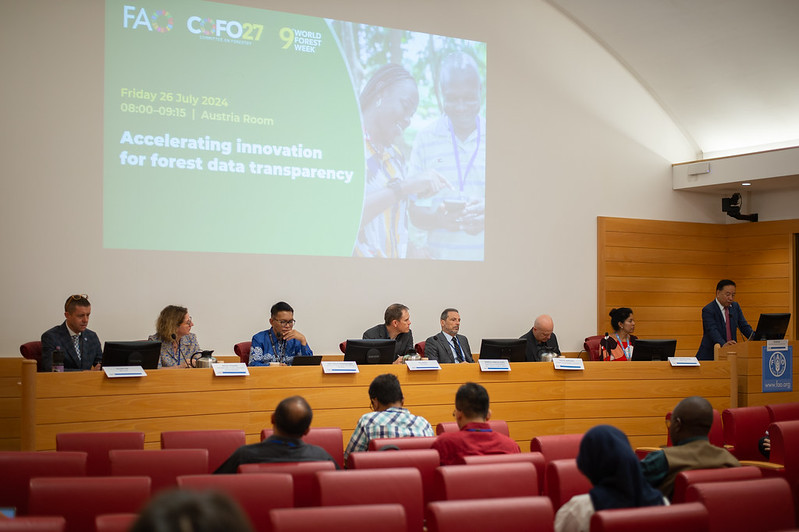Advancing forest data transparency: country leadership and collaborative efforts

On July 26, 2024, the FAO Committee on Forestry (COFO) and World Forestry Week (WFW) hosted a key side event "Accelerating Innovation for Forest Data Transparency." The event spotlighted the essential role of transparent and accurate forest data in addressing deforestation and fostering sustainable forest management.
Mr. Zhimin Wu, Director of the FAO Forestry Division, kicked off the session by stressing the urgency of tackling forest loss. “We are at a pivotal moment in our efforts to protect the world’s forests,” Wu declared, noting that deforestation destroys 10 million hectares annually, affecting climate change, biodiversity, and human livelihoods. He highlighted the global commitment to stop deforestation and restore 1 billion hectares of degraded land by 2030, emphasizing that achieving this goal depends on precise and timely data.
Wu elaborated on the FAO’s initiatives to bridge the forest data gap through innovative technical solutions. He introduced the Open Foris initiative, which facilitates Measurement, Reporting, and Verification with environmental integrity. “Impressively, 90% of forest submissions from 63 countries to the UNFCCC have used Open Foris,” Wu remarked. The FAO’s key programmes, AIM4Forests and the "Building global capacity to increase transparency in the forest sector (CBIT-Forest)”, are crucial for advancing forest data transparency and supporting climate action.
Dirk Nemitz, Team Lead at the UNFCCC, emphasized the critical role of forests in climate change mitigation. “Especially deforestation emissions contribute to climate change in a very significant way and will be necessary to get under control in order to limit global warming to below 1.5 degrees,” Nemitz said. He explained the enhanced transparency framework (ETF) under the Paris Agreement, which mandates countries to submit climate data biennially starting December 2024. “This data contains factual reporting on greenhouse gas emissions and removals in line with IPCC guidance,” he added. Nemitz praised FAO’s support to countries through Open Foris and national forest monitoring systems, stressing their importance for sustainable forest management and climate finance.
Rocío Cóndor, FAO Forestry Officer, introduced FAO capacity development initiative under CBIT-Forest and AIM4Forests programmes, launched in collaboration with the Global Environment Facility and the UK Government. “These programmes support forest monitoring based on modern monitoring technologies and technical innovation,” Cóndor stated. These initiatives aim to enhance the quality, timeliness, accessibility, and usability of forest data, which is crucial for informed decision-making, empowered communities, and strengthened forest governance. Cóndor also highlighted the “Forest Monitoring for Climate Action” e-learning series, which offers self-paced, multilingual courses to improve accessibility, as well as launching the new National Forest Inventory online facilitated course, starting in September and conducted simultaneously in English, Spanish and French.
Country presentations and panel discussion
The event featured a panel discussion with representatives from Brazil, Indonesia, and the Democratic Republic of Congo (DRC), each sharing their national strategies for forest monitoring and data management.
Erik Teguh Primiantoro from Indonesia showcased the Simontana national forest monitoring system, which integrates field data with remote sensing for comprehensive monitoring. “Monitoring is the key for developing the forest plan,” Erik emphasized, showcasing Indonesia’s commitment to leveraging technology for sustainable forest management.
Willy Kisita Lufuma from the DRC detailed their six-components of the national forest monitoring system, including satellite land monitoring and greenhouse gas inventories. He stressed the importance of transparency and cooperation: “The MRV process will be known to everybody, and the results of REDD+ are published on our web portal.”
Marcus Vinicius Alves from Brazil discussed the National Digital Government Strategy’s role in making forest data accessible. “The National Forest Information System grants full access to all national forest inventory open data,” Alves remarked, highlighting Brazil’s efforts to ensure transparency and public accessibility.
The discussion was enriched by insights from Pascal Martinez of the Global Environment Facility and Nicola Stewart from the UK Foreign, Commonwealth & Development Office. Martinez emphasized the complexity of forest monitoring and the need for ongoing support. “The expectations keep growing, making it crucial to continue international cooperation and support,” Martinez said. He also noted, “Our funding window, the Capacity-building Initiative for Transparency (CBIT), supports these efforts. Climate finance for transparency on forests doesn’t serve only climate purposes: because of the integrated nature of forests, it is also very useful for other sectors, national plans and therefore forest governance.”
Stewart reflected on technological advancements and community involvement, questioning how to balance citizen engagement with data integrity. She also shared insights on the UK's Tree Alert Service and pondered how similar initiatives could be adapted to larger, more diverse countries.
Conclusions and future directions
Moderator Till Neef summarized the discussion, emphasizing the evolution from basic satellite imagery to advanced citizen science and data access. “If we had this event 20 years ago, it would have been about satellite images and confidence intervals. Today, it’s about citizen science, data access, and transparency,” Neef observed.
The session concluded with Julian Fox, FAO Team Leader of Forest Monitoring and Data Platforms team, commending the leadership shown by Brazil, Indonesia, and the DRC. Fox highlighted the significance of national forest monitoring systems in shaping policies and tracking global climate progress. “The real role of the National Forest Monitoring System is to inform and direct national policies, while at the international level, they are invaluable for tracking progress in our collective fight against climate change,” Fox stated.
The event showcased significant advances in forest monitoring and highlighted ongoing challenges and opportunities in ensuring sustainable forest management. It emphasized the need for technology, transparency, and international collaboration in achieving global climate goals.
Recording of the Accelerating Innovation for Forest Data Transparency side event and photo album
